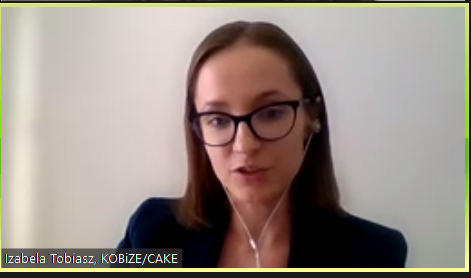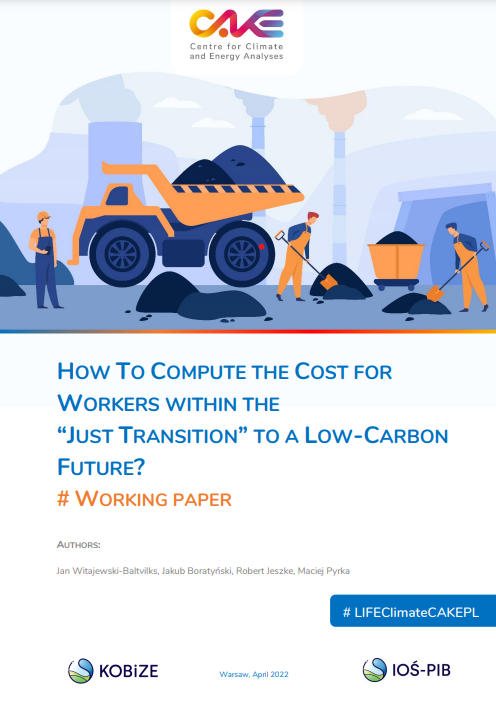
On May 19 2022 Robert Jeszke, the head of the Center for Climate and Energy Analysis (CAKE), took part in the ECEMF 3ng consortium meeting.
Robert Jeszke highlighted CAKE’s experiences in communicating activities to both ministries and non-governmental organizations. He indicated the model tools that CAKE has at its disposal for creating its analyses. He pointed to the role of the earliest commencement of informing about the scope of the analyses carried out through Steering Committees and the daily support of Ministries in the analysis of emerging documents negotiated at the EU level. He mentioned examples of the use of analyses and future steps that CAKE will take to further develop the tools.
On May 18, 2022, Izabela Tobiasz, a modeling expert at the Center for Climate and Energy Analysis, took part in a meeting organized by ECST entitled CBAM Global Townhall 2022.
 The European Commission has put forward a proposal for a Carbon Border Adjustment Mechanism (CBAM) which is the subject of ongoing discussions in the European Parliament and the Council. The lead committee on the CBAM in the European Parliament, ENVI, was voting on compromise amendments on May 17th. This is a decisive moment for the CBAM on the European stage. The exact role of the CBAM on the international arena remains a subject of debate, even as the EU process moves forward. No matter what the final shape and role of the CBAM, if it is to be successful, concerns about circumvention need to be allayed. Questions of resource shuffling, transshipment, and other circumvention and avoidance strategies are frequently voiced by concerned stakeholders and should be addressed. Meeting, convened by ERCST on the basis of its extensive work on the EU CBAM, brought together global thought leaders that have explore these critical aspects of CBAM/BCA, unpacking the proposals and considering the options.
The European Commission has put forward a proposal for a Carbon Border Adjustment Mechanism (CBAM) which is the subject of ongoing discussions in the European Parliament and the Council. The lead committee on the CBAM in the European Parliament, ENVI, was voting on compromise amendments on May 17th. This is a decisive moment for the CBAM on the European stage. The exact role of the CBAM on the international arena remains a subject of debate, even as the EU process moves forward. No matter what the final shape and role of the CBAM, if it is to be successful, concerns about circumvention need to be allayed. Questions of resource shuffling, transshipment, and other circumvention and avoidance strategies are frequently voiced by concerned stakeholders and should be addressed. Meeting, convened by ERCST on the basis of its extensive work on the EU CBAM, brought together global thought leaders that have explore these critical aspects of CBAM/BCA, unpacking the proposals and considering the options.

Izabela Tobiasz referred to the vote of the ENVI committee on CBAM. She mentioned, among others on the extremely important issue of shortening the period of withdrawing free allowances for CBAM sectors (ENVI proposes the period 2026-2030 vs. 2026-2035, EC proposal) or shortening the pilot phase for CBAM sectors by 2024 (the EC proposal assumed its duration until 2026). Izabela Tobiasz also presented Poland’s position in this regard. Finally, she stated that CBAM should be primarily an instrument to encourage developing countries to make appropriate efforts in the field of climate protection. The creation of an instrument directly compensating developing countries for the creation of the CBAM will reduce the effects of the mechanism.
Full recording of the meeting is available here.

On the 13th May 2022, Robert Jeszke, CEO of the Center for Climate and Energy Analysis gave an expert lecture focused on the coal phase out and energy transition challenge at Leuven Institute for Advanced Study in the framework of the project “Societal aspects of climate change”. The lecture was followed with the panel discussion with Eswaran Somanathan and Jos Delbeke (EIB Climate Chair at School of Transnational Governance).
 Coal provides close to 30% of the world energy needs but is also disproportionally contributing to global warming. Electricity generated by coal power plants emits twice as much greenhouse gasses as a gas-powered plant and of course much more than a renewable electricity plant that emits virtually no greenhouse gasses.
Coal provides close to 30% of the world energy needs but is also disproportionally contributing to global warming. Electricity generated by coal power plants emits twice as much greenhouse gasses as a gas-powered plant and of course much more than a renewable electricity plant that emits virtually no greenhouse gasses.
COP 26 failed to agree on a worldwide phase-out plan for coal. This was no surprise as coal has historically been the first and for long the cheapest source of fossil energy and its use is strongly concentrated in a few countries. For some countries like South Africa and Colombia who have ample reserves, coal is also an important export product.
In countries like South Africa and Colombia, getting rid of coal will require moth-balling mining installations, rail lines and power stations and replacing this source of energy by mainly renewable sources as there are sun and wind. Vested interests, be it owners or workers will only agree to the reconversion if the change offers long term benefits not only for the country as a whole but also for the mining regions.
Even in Western-Europe this conversion remains an important issue for a few countries, take Germany where government decided in 2020 to stop producing and using coal (lignite) only in 2038. But there is also Poland, Bulgaria and Romania where the national coal production remains an important part of the local energy production and consumption. In developing countries this conversion will be more difficult. First, energy is for some of them an important export product. Second, most of the work force will be less educated and therefore less easily reskilled to work in other sectors of the economy. Third, the economies in developing countries are often more strongly regulated and this holds certainly for the energy sectors that are an important employer and generator of royalties and government revenues.
During this public LIAS evening, Professor Robert Jeszke elaborated on the challenges of energy conversion in Poland. He stated that the problem today is not only a coal or emission reduction but also social economic transformation that takes time and the social element is a real delaying factor. All available technology would be necessary in transformation – not only solar, wind and energy efficiency, but also biomass, biomass with CCS, hydrogen or nuclear. And another important issue – there will need a lot of funds to cover this energy transision.

CAKE published working paper titled: How to compute the cost for workers within the “Just Transition” to a low-carbon future?
 How to compute the cost for workers within the “Just Transition” to a low-carbon future? (1.1 MiB, 715 hits)
How to compute the cost for workers within the “Just Transition” to a low-carbon future? (1.1 MiB, 715 hits)
 In this paper CAKE proposes a novel methodology that allows to compute the loss of workers throughout the low-carbon transition. CAKE uses microeconomic theory supported with empirical evidence to argue that for many workers in mining sector their current payoff in mining is significantly larger than their potential payoff in other sectors. Next, CAKE incorporates framework in a numerical economic model to compute the loss of workers throughout the low-carbon transition in Poland. CAKE finds that the costs of transition in Poland will be increasing over time and reach 1% of labour compensation in 2040. The cost associated with the loss of workers who were previously employed in the mining sector would amount to more than US$1.1B, close to 0.5% of total labour compensation in Poland in 2040.
In this paper CAKE proposes a novel methodology that allows to compute the loss of workers throughout the low-carbon transition. CAKE uses microeconomic theory supported with empirical evidence to argue that for many workers in mining sector their current payoff in mining is significantly larger than their potential payoff in other sectors. Next, CAKE incorporates framework in a numerical economic model to compute the loss of workers throughout the low-carbon transition in Poland. CAKE finds that the costs of transition in Poland will be increasing over time and reach 1% of labour compensation in 2040. The cost associated with the loss of workers who were previously employed in the mining sector would amount to more than US$1.1B, close to 0.5% of total labour compensation in Poland in 2040.
Computable General Equilibrium (CGE) models predict that the transition to a low-carbon future generates economic costs because low-carbon inputs cannot substitute for their carbon-intensive counterparts without loss of productivity. CAKE argues that there is an additional cost of transition associated with the movement of labour across sectors. The cost arises whenever sectoral labour supply curves are not perfectly elastic and is substantial when curves are inelastic (which is suggested by the empirical literature). When supply is inelastic, i.e. does not respond greatly to changes in wages, it is likely because, for many workers, the opportunity costs of moving to a new sector are lower than their current wage. Hence, when workers are forced to move, they suffer loss. In this paper, CAKE provides a formal framework linking loss of workers due to the transition to a low-carbon economy with the slope of the sectoral labour supply curve. CAKE shows how one can incorporate the system of supply curves into a standard CGE framework and use it to compute the loss of workers throughout the transition in climate policy scenarios.
Below are the Main conclusions of the paper:

On May 4, 2022, Robert Jeszke, head of the Center for Climate and Energy Analysis (CAKE), took part in the EU ETS conference in Florence concerning EU ETS. The meeting was co-organized by the European University Institute, PIK – Potsdam Institute for Climate Impact Research and IETA.
The discussion was moderated by Mr. Jos Delbeke, formerly the highest representative of the European Commission for climate, and currently the climate chairman of the European Investment Bank (EIB) at the EUI School of Transnational Governance. The panel was also attended, among others, by Michael Pahle from PIK, Estelle Cantillon from Research Director at Universite libre de Bruxelles (ULB) or Bernadette Papp from Vertis.

Most of the panellists agreed that the ETS is functioning as intended in providing a long-term signal for investment in decarbonisation because of price growth over the past few years. In the context of improving the efficiency of the EU ETS, there is a need for greater access to market data and information.
Robert Jeszke noticed the first step should be to give the authority to ESMA to monitor the market in a proper way and provided this entity with the data they are supposed to have in this respect. He suggested that ESMA be “empowered” to become a centralised unit for EU carbon market monitoring as ACER does for the EU’s gas market. There is a need to have appropriate market data on which it will be possible to answer the question of who buys or sells on this market and for what purpose. A certain threat is the growing activity of ETF funds. Their market functioning seems questionable, in particular in view of the fact that their headquarters are most often outside the EU. We should take a look for one such fund operating in Australia that may purchase physical allowances on the spot market. And this is in direct competition with the EU ETS operators. Robert Jeszke agreed and added that the high carbon price needed for the transition to new technologies would bring social and political issues. It will be difficult for Europe to be net zero by 2050. The further we go, the further we see this problem, especially in sectors that are really quite hard to abate emissions and the ones that are non-ETS.
